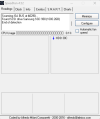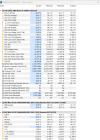Hello everyone. First post here and I must say I am rather touched with how helpful peeps are on this forum. Awesome community.
I experience this problem lately. Mind you it happens when am on windows while doing nothing power intensive.
The screen will go off, I can still hear youtube playing, and after 3-4 seconds I have a complete shut down but with with my fans on full. Then only with hard reset I can reboot.
No minidumps are generated.
My temperatures are fine however I have been using the same PSU for I don't know how long. I do not even remember when I bought it but it is more than 8 years. Probably around 10-14 years. It is a Seasonic 850W which at the time was a premium choice. I think I paid £180 for it. I don't want to buy a new PSU if I can avoid it unless we can be certain this is the problem.
My specs: http://speccy.piriform.com/results/bopNUjHeF0XbTOV1NE2nNET
Thanks a lot folks!
I experience this problem lately. Mind you it happens when am on windows while doing nothing power intensive.
The screen will go off, I can still hear youtube playing, and after 3-4 seconds I have a complete shut down but with with my fans on full. Then only with hard reset I can reboot.
No minidumps are generated.
My temperatures are fine however I have been using the same PSU for I don't know how long. I do not even remember when I bought it but it is more than 8 years. Probably around 10-14 years. It is a Seasonic 850W which at the time was a premium choice. I think I paid £180 for it. I don't want to buy a new PSU if I can avoid it unless we can be certain this is the problem.
My specs: http://speccy.piriform.com/results/bopNUjHeF0XbTOV1NE2nNET
Thanks a lot folks!




